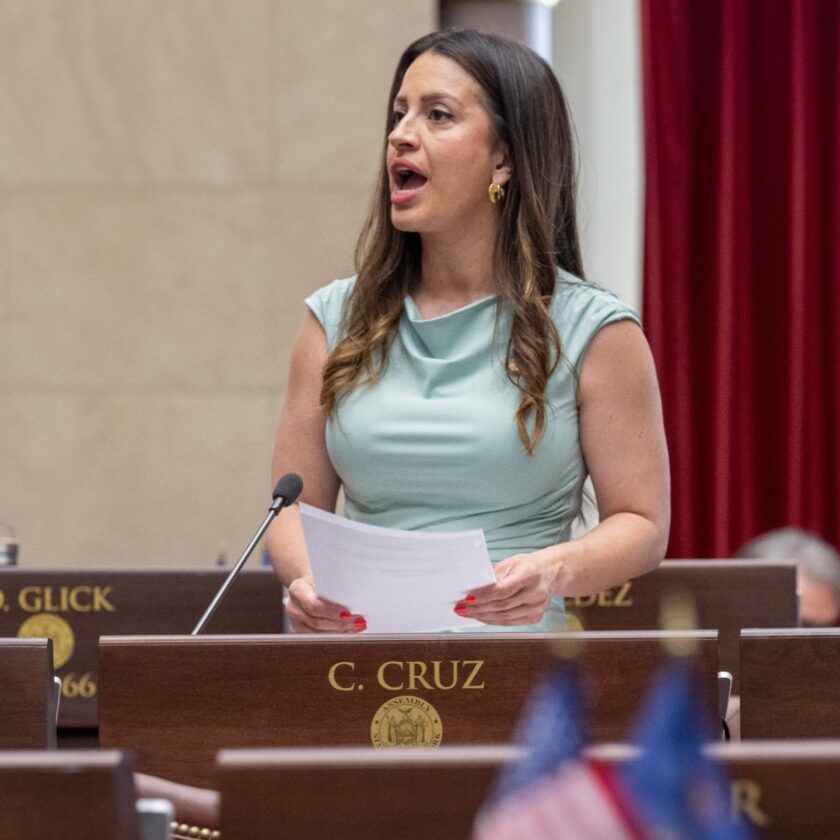Lawmaker Seeks Limits On Doorbell Camera Access

Assemblywoman Catalina Cruz, D-Corona, speaks on the Assembly floor near the end of the 2025 legislative session.
A state lawmaker is proposing limits to who can access audio and video from internet-connected security devices like Ring doorbell cameras.
Assemblywoman Catalina Cruz, D-Corona, has introduced legislation (A.9062) that would prohibit police departments from accessing the recordings without a warrant or specific consent from the owner of the equipment. The rapid adoption of smart surveillance devices in homes and neighborhoods has created unprecedented privacy risks. These devices capture sensitive video and audio data of individuals, families, and communities, often stored by third-party companies with the technical ability to share such information with government agencies,” Cruz wrote in her legislative justification. “Currently, law enforcement may access this data through contractual arrangements with ‘companies or through voluntary disclosure without the knowledge or consent of users. This bill ensures that traditional constitutional protections against unlawful searches extend into the digital age by requiring a warrant supported by probable cause, or the user’s specific consent, before such sensitive surveillance data can be accessed.”
The legislation would create a new section of the state’s Civil Rights Law named the Smart Surveillance Device Privacy Act. Police departments would not be allowed to access surveillance information from operators or from directly accessing smart surveillance devices without a valid search warrant unless the device’s owner gives specific consent, if the device is lost or stolen with the owner consent or in emergencies involving imminent danger, but judicial approval would be required within 72 hours. Improper access would require any information gleaned from the security camera to be destroyed and users to be notified within 72 hours. Notice could be delayed up to 90 days if it could jeopardize an investigation.
Cruz’ bill would void any agreement allowing government access to surveillance information without a warrant or user consent. Warrants would have to specify the information sought, time period, device targeted, and location if known. Non-relevant data would remain sealed.
Unlawfully obtained surveillance information may be suppressed in court, with the state Attorney General’s office given authority to bring civil actions to enforce. Operators acting in good faith on valid warrants or orders are granted immunity. Improperly obtained surveillance information would be inadmissible in criminal, civil, or administrative proceedings.
“By establishing strict limits on government access, this legislation strikes the proper balance between legitimate law enforcement needs and the fundamental right of New Yorkers to privacy in their homes and personal lives,” Cruz wrote.
In 2024 Ring ended a program called Request for Assistance that allowed police to obtain videos from Amazon by clicking a button. That decision was hailed by civil liberties groups. Ring has unveiled a new program called Community Requests to help police obtain videos captured with Ring security cameras in partnership with Axon, a manufacturer of policy body-worn cameras and tasers that also operates a digital evidence management system for law enforcement agencies, according to a Consumer Reports story released Monday.
In 2024 Ring ended a program called Request for Assistance that allowed police to obtain videos from Amazon by clicking a button. That decision was hailed by civil liberties groups. Ring has unveiled a new program called Community Requests to help police obtain videos captured with Ring security cameras in partnership with Axon, a manufacturer of policy body-worn cameras and tasers that also operates a digital evidence management system for law enforcement agencies, according to a Consumer Reports story released Monday.
According to Ring, Community Requests is a privacy-protected service that enables public safety agencies to put out public requests for help and efficiently and securely collect and manage digital evidence. Public safety agencies can post a request in the Neighbors feed asking community members within a specific area to share Ring video footage or information that may help their investigation. Videos that customers choose to share in response to Community Requests go directly to Axon Evidence, a secure evidence management system where they can be verified for authenticity and integrity. Ring officials say the link with Axon Evidence creates a complete audit trail of how and when public safety agencies collect information.
When a crime is reported, local public safety agencies who are verified and Axon Evidence users can submit a Community Request. Each request must include:
– Details about the incident
– The date and timeframe for the requested footage
– The investigator’s contact information
– A map showing the area the request covers
The request appears publicly on the Neighbors feed, and Ring users within the designated area receive a notification.
Camera owners decide if they want to share relevant video clips or ignore the notification. Ring says police can’t track users who refuse to provide access to videos.
Videos shared in response to Community Requests go directly to Axon Evidence, a secure evidence management system where they can be verified for authenticity and integrity. This also creates a complete audit trail of how and when public safety agencies collect information.
Those who have a non-Ring camera can participate in the Neighbors App and see community requests in the app’s feed. According to Ring, those non-Ring users can view all post details, leave comments and contact the investigator directly by phone or email.




